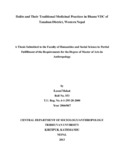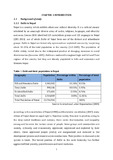Please use this identifier to cite or link to this item:
https://elibrary.tucl.edu.np/handle/123456789/2774| Title: | Dalits and Their Traditional Medicinal Practices in Bhanu VDC of Tanahun District, Western Nepal |
| Authors: | Mahat, Laxmi |
| Keywords: | Strategies;Natural resources;Recommendations. |
| Issue Date: | 2013 |
| Publisher: | Central Department of Sociology and Anthropology |
| Abstract: | Dalits, known and considered as the ‘untouchables’ in the country, are about 13 per cent but in the VDC and Tanahun district they are dominant. Dalits groups are frequently oppressed and centrifuged to mainstream and are always considered as secondary interest of research due to deep rooted socio-economic and cultural structure and value. Majority of them use forests and forest products (medicinal plants) by utilizing their traditional knowledge, occupation and skills eking out their living. Forests are considered as free commodity and the forest products particularly medicinal plants are open accessed in Nepal. Due to direct or indirect connection with forests and other natural resources, Dalits may know better than others about natural resources and forests, their uses, importance and management practices. The collection is important for primary health care of Dalits groups because the groups have limited options for modern medication as a consequence of socio-economic conditions. The present study attempts to analyze the dependency of Dalit groups (who are at the bottom in the caste ladder and traditionally ‘untouchables’) on forests for their subsistence and health care. Again there are a very few studies integrating traditional medicinal practices, their resources and conservation initiatives and such studies from Dalits are largely under-studied. Information were collected using field visits, household survey, key informant interview, group discussion and snow-ball sampling between August and September, 2013. Prior informed consent from the informants was granted. Altogether 36 Dalit individuals were consulted in questionnaire survey to generate information about dependency on forests, traditional knowledge on medicinal plants and their use in healing practices. Collected information were triangulated and validated following standard procedures. Secondary (literature review) data/information were extensively reviewed and intensively used while discussing the findings and cross-checking the information. As found elsewhere, health of Dalits of Bhanu VDC was complicated by fever, typhoid, gastric, common cold, pregnancy and delivery and diarrhea ailments. Only 55 percent of Dalits preferred health centers access to other means. Though the access to allopathic medicines has been easier and increasing, Dalits of the study area were still dependant on folklore shamans (Dhami-Jhankri), faith-healers (jharne-phukne) and herbal treatment because Dalits and all local communities in the VDC believe that health is more than wrong with an individual. In shamanism and faith healing, people seek help for physical and emotional healings as well as betterment of their animals and crops from natural calamities. So shamans and faith healers are the first line of help that a Dalit household looks for in many situations. Both shamanism and faith healing commonly use representations of the five gross elements of nature (earth, air, fire, water and aether/aakash) and some medicinal plants but fire and water was more frequent. Medicinal plants were frequently applied in traditional healing next to water and fire. Altogether 65 plants have been used in Bhanu VDC. Among them only Sipligan, Sikari lahara, Nirmasi and Neem have been used for multiple ailments. There are only 6 herbal healers in the VDC and they have been working for healing for centuries. Home herbal healing is arduous work because it needs particular medicinal plants and materials that are difficult to harvest and get in today's situation, resulting in declining in practice. Both the knowledge and resources therefore are necessary to manage for their sustainability for wellbeing of Dalits and entire community. |
| URI: | http://elibrary.tucl.edu.np/handle/123456789/2774 |
| Appears in Collections: | Sociology |
Files in This Item:
| File | Description | Size | Format | |
|---|---|---|---|---|
| Cover.pdf | 113.82 kB | Adobe PDF |  View/Open | |
| Chapter.pdf | 606.79 kB | Adobe PDF |  View/Open |
Items in DSpace are protected by copyright, with all rights reserved, unless otherwise indicated.
